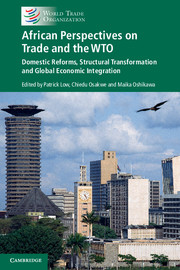 African Perspectives on Trade and the WTO
African Perspectives on Trade and the WTO Book contents
- African Perspectives on Trade and the WTO
- African Perspectives on Trade and the WTO
- Copyright page
- Contents
- Figures
- Plates
- Contributors
- Message
- Joint Foreword
- Book part
- Glossary
- Disclaimer
- 1 Introduction and Overview
- Part I The Future of the Multilateral Trading System: Perspectives from African Policy-Makers and Partners
- Part II Africa’s Participation in the Rules-Based Multilateral Trading System
- Part III Selected Development Experiences and Perspectives
- Book part
- Index
- Plate Section (PDF Only)
- Book part
- References
Part I - The Future of the Multilateral Trading System: Perspectives from African Policy-Makers and Partners
Published online by Cambridge University Press: 27 October 2016
- African Perspectives on Trade and the WTO
- African Perspectives on Trade and the WTO
- Copyright page
- Contents
- Figures
- Plates
- Contributors
- Message
- Joint Foreword
- Book part
- Glossary
- Disclaimer
- 1 Introduction and Overview
- Part I The Future of the Multilateral Trading System: Perspectives from African Policy-Makers and Partners
- Part II Africa’s Participation in the Rules-Based Multilateral Trading System
- Part III Selected Development Experiences and Perspectives
- Book part
- Index
- Plate Section (PDF Only)
- Book part
- References
Summary
The African Union’s (AU) priorities at the WTO reflect the priorities of the WTO’s African member states that the multilateral trading system should contribute to the economic development of their economies through the elaboration of equitable, fair and development-friendly rules. The position of the AU is consistent with the recently adopted United Nations Sustainable Development Goals (SDGs), which also see trade as being critical to achieving the goal of eradicating extreme poverty everywhere. The AU’s priority is, therefore, to see WTO outcomes that serve to facilitate the structural economic transformation and development of developing and least-developed African countries in line with the vision of the African Union’s Agenda 2063.
- Type
- Chapter
- Information
- African Perspectives on Trade and the WTODomestic Reforms, Structural Transformation and Global Economic Integration, pp. 13 - 66Publisher: Cambridge University PressPrint publication year: 2016


